Africa, often described as the cradle of humankind, is home to a rich cultural heritage, diverse traditions, stunning landscapes, and bustling metropolises. While parts of Africa grapple with issues of safety and security, several cities stand out for their relative tranquillity and safety, making them must-visit destinations.
Here are ten of the safest cities in Africa that travelers can consider for their next trip.
Kigali, Rwanda
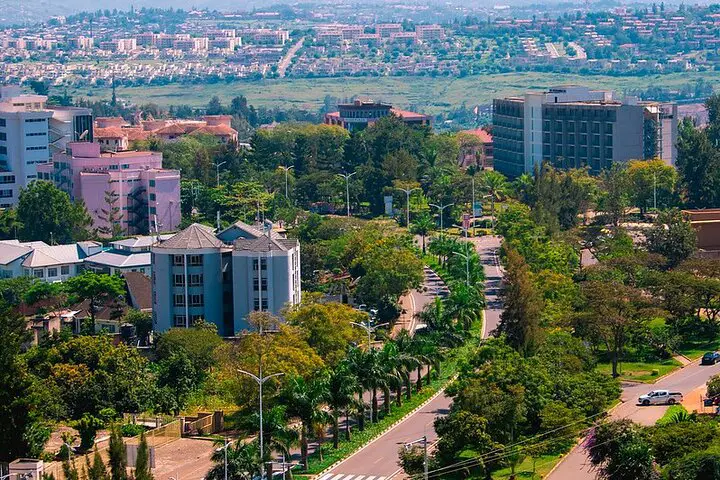
Kigali is located near the geographic center of the country, making it an ideal hub from which to explore the rest of Rwanda. The city is sprawled across numerous hills, ridges, and valleys, and has a stunning backdrop of mountains – a feature that has earned Rwanda the moniker “Land of a Thousand Hills.”
Kigali is often praised as one of Africa’s safest and cleanest cities. This is due in part to strict regulations, such as a ban on non-biodegradable plastic bags, and community-led initiatives like the monthly umuganda, a nationwide clean-up that takes place on the last Saturday of each month.
Kigali is a city of contrast, with bustling markets, a vibrant arts scene, and lively cafes and restaurants, set against a backdrop of quiet streets and verdant boulevards. The city has a number of important historical and cultural sites, including the Kigali Genocide Memorial, a poignant reminder of the country’s past, and the Inema Arts Center, showcasing some of the best contemporary art in East Africa.
Kigali is not just the political capital of Rwanda, but also the country’s economic hub. The city has shown significant economic growth in the last two decades and is a center for banking, finance, and commerce. The city’s convention center, recognizable by its iconic dome, is a symbol of Kigali’s ambition to become a major meeting place for international conferences.
The city also has a thriving food scene. Rwandan cuisine, known for its locally sourced ingredients and traditional cooking methods, can be sampled in local markets or more upscale restaurants. Dishes like “isombe” (cassava leaves with dried fish), “mizuzu” (fried plantains), and “brochettes” (goat kebabs) are popular.
Kigali’s blend of history, culture, safety, and progress make it an appealing destination for travelers interested in exploring Africa.
Windhoek, Namibia

Windhoek is nestled in the central highlands of Namibia and is roughly at the geographic center of the country. The city’s landscape is dominated by the majestic Auas and Eros mountain ranges. It enjoys a semi-desert climate, with hot days and cool nights.
Windhoek’s history is a fusion of German colonial and African influences. The city was founded in the late 19th century by Imperial Germany during the period of colonization. The architecture of the city’s older buildings reflects its German colonial past, including the Alte Feste (Old Fortress), Christuskirche, and Tintenpalast (Ink Palace).
Windhoek is one of Africa’s safer capitals, with a well-organized infrastructure. However, like any other city, it’s important for visitors to remain vigilant and take standard travel precautions.
The city offers a blend of modern shopping malls and historic landmarks. Windhoek is also the cultural heart of the country, hosting music festivals, art galleries, and museums. Notable attractions include the National Gallery of Namibia, showcasing the country’s visual arts, the Namibia Craft Centre, featuring local crafts, and the National Museum of Namibia, housing historical and cultural exhibits.
Windhoek is the economic hub of the country. It’s the headquarters of most of the country’s businesses and industries, and is the cleanest city in Africa, according to several rankings.
The city’s food scene reflects its diverse cultural history. German influence is prominent with foods like wurst (sausages), sauerkraut, and locally brewed beers being popular. Traditional Namibian dishes, such as biltong (dried, cured meat), kapana (street food-style meat), and game meat from local wildlife are also common.
The city serves as the primary gateway for tourists to explore the country’s stunning natural wonders like the Namib Desert, Fish River Canyon, and Etosha National Park.
In summary, Windhoek offers a unique blend of European and African cultures, surrounded by some of the most breathtaking landscapes in Africa. It’s a city where modern development harmoniously coexists with an appreciation for the country’s diverse history and heritage.
Gaborone, Botswana
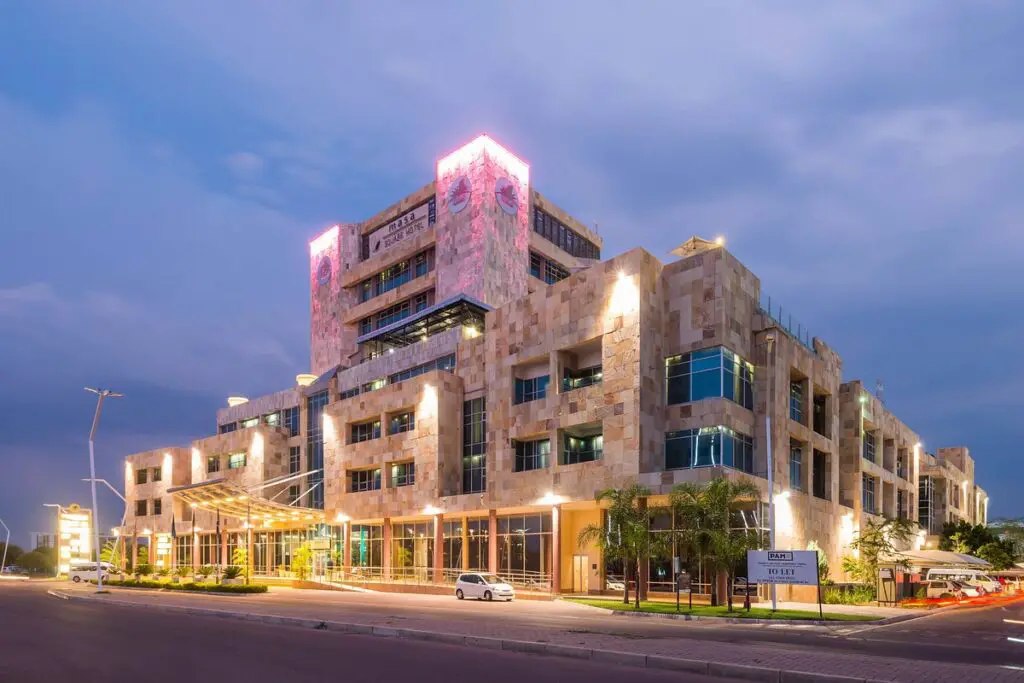
Gaborone is located in the southeastern region of Botswana, close to the border with South Africa. It lies between Kgale and Oodi Hills, near the confluence of the Notwane River and Segoditshane River.
The city was named after Chief Gaborone of the Tlokwa tribe, who migrated to the area from South Africa in the 1880s. Gaborone became the capital of Botswana when the country achieved independence in 1966.
Gaborone is considered one of the safest cities in Africa. Its rapid development over recent decades has seen significant improvements in infrastructure, making it an accessible and comfortable destination for tourists.
Despite its rapid modernization, Gaborone has retained its cultural roots. The city is home to numerous cultural and historical landmarks such as the National Museum, which houses art and historical exhibits, and the Three Dikgosi Monument, a statue that commemorates three tribal chiefs instrumental in Botswana’s independence.
For nature enthusiasts, the Gaborone Game Reserve offers the chance to see native wildlife, and Kgale Hill provides excellent hiking opportunities with panoramic views of the city.
Gaborone is the economic capital of Botswana. The city is home to the Botswana Stock Exchange and numerous international corporations, reflecting its position as an emerging African economic hub. It also serves as a trade gateway between Botswana and South Africa.
Botswana’s cuisine reflects a rich tradition of farming, with corn and beef forming the basis of many dishes. In Gaborone, you can find an eclectic mix of restaurants offering traditional Botswana food as well as international cuisines.
Gaborone also serves as a gateway to explore Botswana’s famed natural landscapes, including the Okavango Delta, the Kalahari Desert, and Chobe National Park.
Gaborone combines its role as a bustling capital and economic powerhouse with a firm grounding in its rich cultural traditions and a proximity to some of Africa’s most unique natural landscapes.
Port Louis, Mauritius

Port Louis is located on the northwest coast of Mauritius and is the country’s economic, cultural, and political hub. The city is set in a semicircle of mountains, making it a natural harbor.
Port Louis was founded in 1736 by the French East India Company. It was named in honor of King Louis XV. Over the years, the city has served as an important naval base during the Napoleonic Wars and a stopover on the spice trade route.
Port Louis has a well-developed infrastructure and is considered relatively safe compared to many other African cities. The government has made significant efforts to modernize the city, improve public safety, and promote tourism.
Port Louis is a cultural melting pot due to the diverse mix of ethnic groups that live there. The city’s rich history is reflected in its architecture, which includes French colonial buildings, Indian temples, and modern skyscrapers. Key attractions include the Mauritius National Botanical Garden, the Blue Penny Museum (showcasing the cultural history of the island), the bustling Central Market, and the Caudan Waterfront.
Port Louis is the financial and business center of Mauritius. Its economy is diversified into manufacturing, tourism, finance, and trade. The city hosts the Stock Exchange of Mauritius, numerous banks, and is the commercial heart of the country.
The city’s cuisine reflects its diverse cultural influences, including Creole, Indian, Chinese, and French. Street food is a key feature of the culinary scene in Port Louis, with dishes like dholl puri (a kind of flatbread served with bean curry) and gateau piment (chili cakes).
The city also offers easy access to the beautiful beaches, lagoons, and mountains of Mauritius. For wildlife enthusiasts, the nearby Casela World of Adventures provides an opportunity to explore African wildlife in a safari setting.
In summary, Port Louis is a vibrant city that merges its rich history, diverse culture, and economic vitality with the natural beauty of its surrounding landscapes.
Victoria, Seychelles
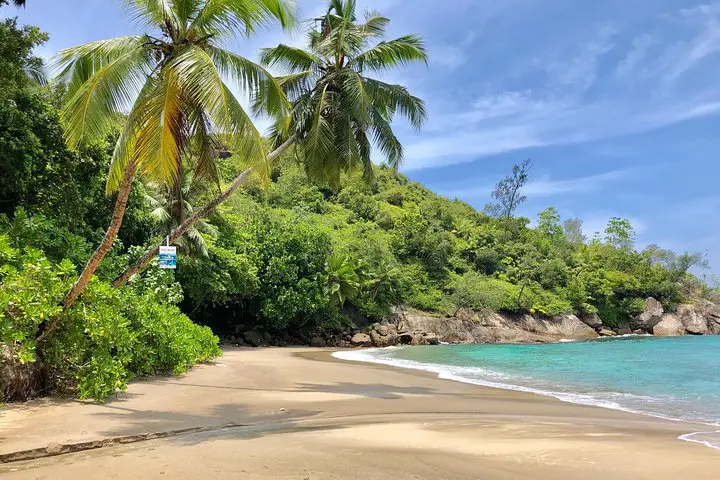
Victoria is located on the northeastern coast of Mahé, the largest island in the Seychelles. Despite being the nation’s capital, it retains a charming, small-town feel and is considered one of the smallest capitals in the world.
Victoria was established as the seat of the British colonial government in the late 18th century. It was originally known as “Établissement du Roi” during the French colonial period but was renamed Victoria when the British took control of the islands.
Victoria is considered safe for residents and tourists alike. The city has well-maintained infrastructure, including well-paved roads and reliable public services.
Despite its small size, Victoria has plenty to offer. Visitors can explore its bustling markets, including the famous Sir Selwyn Selwyn-Clarke Market, which sells a variety of goods, from fresh produce to local handicrafts. Other attractions include the Seychelles National Botanical Gardens, home to an array of exotic plant species, and the Seychelles Natural History Museum. The city’s most iconic landmark is a small-scale replica of London’s Big Ben, known as the Victoria Clock Tower.
Victoria is the economic heart of Seychelles. Its economy is primarily driven by tourism, fishing, and small-scale manufacturing. The Seychelles International Airport and the country’s main seaport are located here, contributing significantly to the local economy.
The culinary scene in Victoria reflects the diversity of Seychellois culture, with Creole cuisine being dominant. Fresh seafood is an important component of local dishes. The city also offers a number of eateries that serve international cuisines.
Victoria serves as a gateway to the rest of Seychelles’ 115 islands. Its strategic location makes it the perfect starting point for exploring the archipelago’s stunning beaches, marine parks, and nature reserves.
In conclusion, Victoria, with its laid-back atmosphere, cultural richness, and access to Seychelles’ natural beauty, is a charming and attractive destination for travelers.
Accra, Ghana
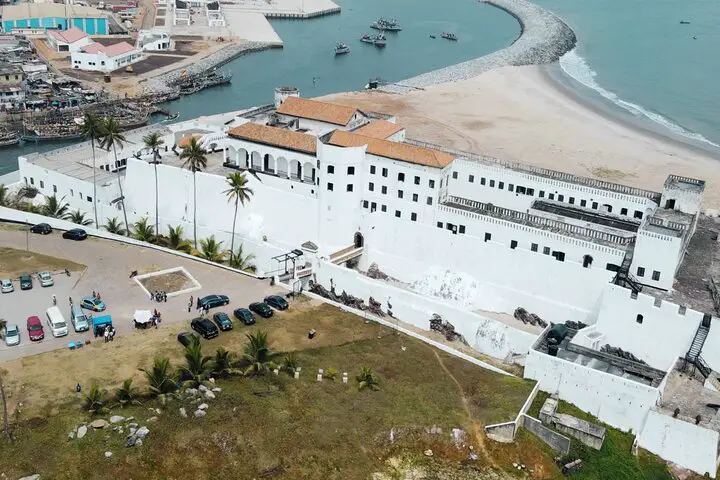
Accra is located along the Gulf of Guinea, part of the Atlantic Ocean. The city spans several geographic landscapes, including sandy beaches, marshlands, and hilly areas.
Accra has a rich history, dating back to the 15th century when it was originally settled. It developed into a significant trading hub during the era of the Atlantic slave trade. Accra became the capital of the British Gold Coast colony, and after Ghana gained independence in 1957, it remained the political and economic hub of the country.
Accra is generally considered safe, especially in comparison to other West African cities. However, as in any large city, visitors should remain vigilant. The city’s infrastructure has seen significant improvements, especially in terms of transportation and utilities, but rural-urban migration continues to put pressure on the city’s resources.
Accra is a vibrant city known for its lively arts scene, rich history, and cultural diversity. The city’s major attractions include the National Museum of Ghana, which showcases the country’s history and culture, and the Kwame Nkrumah Mausoleum, dedicated to Ghana’s first president. The bustling Makola Market offers an authentic experience of daily life in Accra.
Accra is the economic and administrative hub of Ghana. The city’s economy is diverse, with sectors like finance, real estate, and services playing a significant role. Accra is also home to the headquarters of many international corporations operating in West Africa.
Accra’s food scene reflects the diverse cultural influences of the country. Traditional Ghanaian dishes like jollof rice, fufu, and banku are popular. The city’s restaurant scene is booming, with a range of eateries serving local and international cuisines.
Accra serves as a starting point for exploring the rest of Ghana. It provides convenient access to historical forts and castles along the coast, the beautiful Volta Region with its lush landscapes, and the cultural richness of the Ashanti Region.
In summary, Accra is a city that combines the vibrancy of urban Africa with a rich cultural history and access to Ghana’s diverse natural and cultural attractions.
Tunis, Tunisia

Tunis is located in the north-eastern part of Tunisia, near the Lake of Tunis and the Mediterranean Sea. The city is flanked by the mountains of the Atlas range and is close to the ancient ruins of Carthage.
Tunis has a rich and complex history dating back to the 2nd millennium BCE. It grew to prominence under the rule of ancient Carthage, later becoming a part of the Roman Empire. Throughout its history, it has been influenced by Berber, Arab, Ottoman, and French cultures, all of which have left their marks on the city’s architecture and cultural life.
Tunis is considered one of the safer cities in North Africa, but like any large city, it has its share of crime, so visitors should exercise standard travel precautions. Infrastructure in Tunis is generally good, with reliable utilities and transport links.
The city is known for its historic medina, a UNESCO World Heritage site that features narrow winding streets, mosques, and bustling souks. Other key attractions include the Bardo National Museum, which houses one of the world’s largest collections of Roman mosaics, and the ruins of Carthage. Tunis also has a vibrant arts scene, hosting several music and film festivals throughout the year.
Tunis is the economic hub of Tunisia. Its economy is diverse, with sectors like textiles, agriculture, and services playing significant roles. The city is also the administrative center of the country, housing government offices and foreign embassies.
Tunisian cuisine is a blend of Mediterranean and desert dwellers’ culinary traditions. Common dishes in Tunis include couscous, brik (a kind of pastry), and harissa (a spicy chili pepper paste). The city offers a wide variety of dining options, ranging from traditional Tunisian restaurants to more international offerings.
From Tunis, visitors can easily explore the rest of Tunisia, including the stunning beaches along the Mediterranean coast, the Saharan landscapes of the south, and historical sites like the Roman amphitheater at El Jem.
In conclusion, Tunis is a city where modern life and centuries of history coexist, offering a unique blend of cultural experiences and attractions for visitors.
Rabat, Morocco
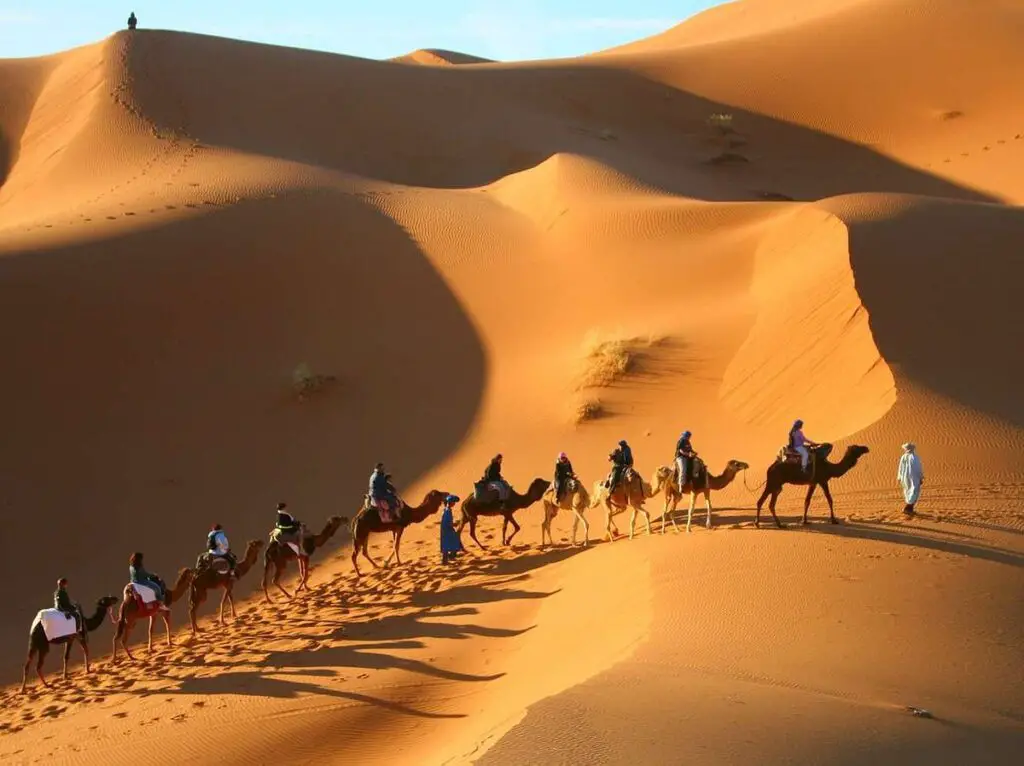
Rabat is located on the Atlantic coast, at the mouth of the river Bou Regreg. It’s directly across the river from the city of Salé, and together, they form a significant urban area of Morocco.
Rabat’s history dates back to the 3rd century BC, with the area being influenced by the Phoenicians, Romans, and various Arab dynasties. It was given the status of a capital under the reign of Sultan Yacoub al-Mansour in the 12th century, and it has remained the political capital of the country since the French Protectorate period in the early 20th century.
Rabat is considered to be one of the safest cities in Morocco. It benefits from well-developed infrastructure, with modern roads, public transportation systems, and a range of accommodation options from budget to luxury.
The city is known for its rich cultural heritage, with the historic district known as the Medina, and the Roman ruins at Chellah, being major tourist attractions. The Mausoleum of Mohammed V, a grand royal tomb, is another must-visit site. The city also boasts a lively arts scene and hosts a range of cultural festivals throughout the year.
As the capital city, Rabat is a major player in the Moroccan economy. It’s home to numerous national institutions and public administrations, including the central bank and several embassies. The economy of Rabat is diversified, with sectors such as textile, food processing, and construction playing key roles.
Moroccan cuisine, known for its rich flavors and variety, is readily available in Rabat. Signature dishes include couscous, tajine (slow-cooked stews), and pastilla (a sweet and savory meat pie). The city’s culinary scene also offers international cuisine due to its cosmopolitan nature.
Rabat’s location makes it a convenient gateway to explore other parts of Morocco, from the bustling city of Casablanca to the historic city of Fez, and the stunning landscapes of the Atlas Mountains.
In conclusion, Rabat offers a blend of historical charm and modern convenience, with a vibrant cultural scene and a rich culinary tradition, making it a compelling destination for travelers to Morocco.
Maputo, Mozambique
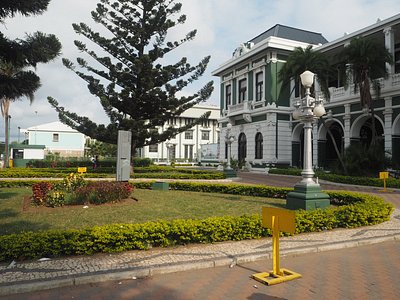
Maputo is located in the far south of Mozambique, on the coast of the Indian Ocean. The city’s geography is dominated by its harbor, one of the most important in East Africa, and the Maputo River to the north.
Maputo has a rich history, with a unique blend of African, Portuguese, and early Arab influences. Originally known as Lourenço Marques, the city was renamed Maputo after Mozambique gained independence from Portugal in 1975.
Maputo is considered relatively safe compared to many other African cities, although it’s always important for visitors to take standard travel precautions. The city’s infrastructure has seen significant improvements in recent years, particularly in terms of transportation and communication networks.
Maputo is a culturally vibrant city, offering a blend of African and Portuguese influences. Key attractions include the Fortress of Maputo, a historical military site, the CFM Railway Station, an architectural landmark, and the Maputo City Hall. The city is also known for its wide avenues lined with jacaranda and acacia trees, which bloom spectacularly in spring.
Maputo serves as the economic center of Mozambique. Its economy is primarily based on trade and commerce, manufacturing, and services. The Port of Maputo is a significant economic asset, serving as a key export route for the country’s coal and other resources.
Maputo’s food scene reflects its cultural melting pot, offering a variety of cuisines including African, Portuguese, and Indian. Seafood is a staple here, with dishes like Matapa, a seafood stew made with cassava leaves and coconut milk, being popular.
Maputo serves as an excellent base for exploring the country’s stunning beaches and marine parks, as well as its wildlife-rich national parks.
In conclusion, Maputo, with its fusion of cultures, rich history, burgeoning economy, and access to Mozambique’s natural beauty, offers a unique and vibrant African city experience.
Cape Town, South Africa
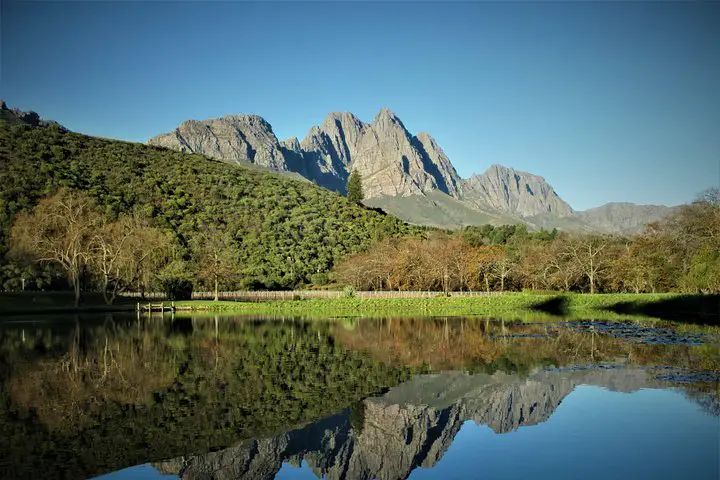
Cape Town is located in the southwestern tip of South Africa, nestled at the base of Table Mountain and flanked by the Atlantic Ocean. The city is known for its breathtaking natural beauty, from its mountainous surroundings to its stunning coastline.
Cape Town has a rich history and was first developed by the Dutch East India Company as a supply station for Dutch ships sailing to East Africa, India, and the Far East. It also has a complex colonial history, having been controlled by both the Dutch and the British. The city played a significant role in the anti-apartheid movement.
While Cape Town is a popular tourist destination, it does have varying levels of safety across the city. Some areas are considered safe and well-policed, while others may have higher crime rates. The city has good infrastructure, particularly in the central business district and other tourist areas, including public transportation, well-maintained roads, and a range of accommodation options.
Culture and Tourism: Cape Town is a cultural hub with numerous museums, galleries, and theatres. Some of the key attractions include Table Mountain, which offers panoramic views of the city, the Victoria & Alfred Waterfront, a popular shopping and entertainment district, and Robben Island, where Nelson Mandela was imprisoned for 18 years. Cape Town is also known for its beach culture, with beautiful beaches like Clifton and Camps Bay.
Cape Town is a significant economic hub within South Africa. It’s a center of commerce, technology, and production, with sectors such as real estate, insurance, retail, and manufacturing playing major roles. Tourism is also a significant contributor to the economy.
Cape Town’s food scene is diverse and reflects its multicultural history. You can find a mix of traditional African, Dutch, and British foods, as well as Indian cuisine due to the city’s large Indian community. The city and its surroundings are also famous for wine production, with numerous vineyards and wine tasting tours available for visitors.
Beyond the city, Cape Town provides easy access to natural wonders such as the Cape of Good Hope and Boulders Beach, home to a colony of African penguins.
Cape Town is a city of immense natural beauty, rich history, cultural diversity, and economic significance. It offers a wide range of experiences, from hiking up Table Mountain to exploring its dynamic culinary scene, making it a popular destination for travelers.

